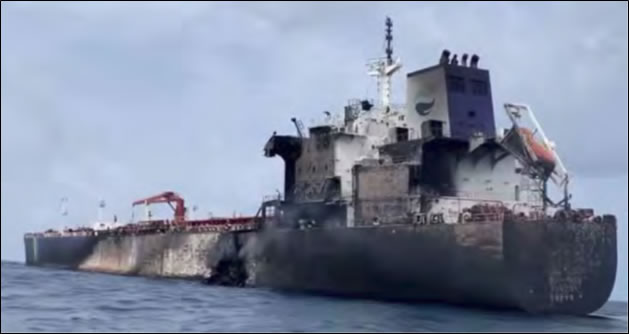

DOSSIER
- Welcome
Accueil - Nieuws
Nouvelles- 28/12 UK to check ‘shadow fleet’ tankers for ‘suspect, dubious’ insurance during English Channel transits
- 31/12 Transpetro to use Marlink’s VSAT + Starlink hybrid solution on 26 tankers
- 01/01 U.S. Sanctions Fail to Stop Chinese Power Plant, Delivery Salvages Next Stage of Russian Arctic LNG Plant
- 03/01 India’s Oil Demand Drives CMB Tech Fleet Diversification
- 07/01 World’s Oldest Shipwreck Is at Dokos Island, Greece
- 09/01 Port Oostende Fights to Preserve Critical RoRo Shipping Route.
- 11/01 LNG bunkering poised for a bright future
- 14/01 Russische driemaster Shtandart nergens welkom, kapitein wacht met smart op coulance van Brussel
- 16/01 Russia resells more gas in Europe after cutting off Austria, sources, data show
- 21/01 EU Closes in on More Tanker Sanctions to Enforce Russian Oil Price Cap
- 23/01 Black swan events keep container lines shipshape
- 25/01 As war blocks Russia, China boxes take Middle Corridor
- Kalender Calendrier
- BML Nieuws
LMB Nouvelles - Historiek
Historique- 18/11 De schipbreuk van de kotter Princess of Wales en de schoener l'Aventure (I)
- 25/11 De schipbreuk van de kotter Princess of Wales en de schoener l'Aventure (II)
- 08/12 Een beetje geschiedenis (I)
- 15/12 Een beetje geschiedenis (II)
- 21/12 Een beetje geschiedenis (III)
- 29/12 De schipbreuk van de kotter Princess of Wales en de schoener l'Aventure (III)
- 05/01 De schipbreuk van de kotter Princess of Wales en de schoener l'Aventure (IV)
- 12/01 De schipbreuk van de kotter Princess of Wales en de schoener l'Aventure (V)
- 19/01 De schipbreuk van de kotter Princess of Wales en de schoener l'Aventure (VI)
- 26/01 Gamming Chairs and Gimballed Beds: Women on board 19th-century Ships
- Dossier
Dossier
- 27/12 Dirty-to-clean switch caps high LR2 tanker freight rates as supply widens
- 30/12 How SECNAV’s claims about S. Korean, Japanese shipbuilders do and do not line up
- 02/01 Why do ships ‘zig’ when they should have ‘zagged’?
- 04/01 Namibia to rival Guyana as world’s newest oil and gas hotspot following massive offshore discoveries
- 06/01 Zenobe Gramme
- 08/01 How SECNAV’s claims about S. Korean, Japanese shipbuilders do and do not line up
- 10/01 Ocean container shipping market reaches a tipping point
- 13/01 La révolution culturelle chez Maersk, les revirements et autres effets de panique
- 15/01 Sharing tussles over major sea route worry exporters
- 17/01 Somali piracy: It's more sophisticated than you thought
- 20/01 Containership and port operators face a host of issues as peak season arrives
- 22/01 Pioneering Spirit picks up the reins for GTA deepwater pipelay
- 24/01 'Dark fleet' of oil tankers risk more maritime disasters in Asia
- Raad
Comité - Verenigingen
Associations - Contacten
Contacts - Links
Liens - Boeken
Livres - Archives
Archieven- Archieven 1 - Archives 1
- Archieven 2 - Archives 2
- Archieven 3 - Archives 3
- Archieven 4 - Archives 4
- Archieven 5 - Archives 5
- Archieven 6 - Archives 6
- Archieven 7 - Archives 7
- Archieven 8 - Archives 8
- Archieven 9 - Archives 9
- Archieven 10 - Archives 10
- Archieven 11 - Archives 11
- Archieven 12 - Archives 12
- Archieven 13 - Archives 13
- Archieven 14 - Archives 14
- Archieven 15 - Archives 15
- Archieven 16 - Archives 16
- Archieven 17 - Archives 17
- Archives 18 - Archieven 18
- Archieven 19 - Archives 19
- Photos
Foto's
'Dark fleet' of oil tankers risk more maritime disasters in Asia
The West needs to bring Russian oil shipping out of the shadows
By : Vandana Hari
A collision between two oil tankers off Singapore on July 19 has put a fresh spotlight on the dangers posed by a recently enlarged fleet of vessels that engage in illicit practices to avoid detection while transporting barrels from sanctioned countries on long and sometimes circuitous voyages.Asia, which uses oil sanctioned by the U.S. or European nations, is the most vulnerable region to such accidents, especially in the busy shipping lanes around Singapore and Malaysia.The onus of dealing with the ecological and economic fallout of such maritime mishaps will inevitably fall on the region's governments, which have no realistic means of preventing them.The July accident, in which the Singapore-flagged Hafnia Nile, a tanker that was on its way to Japan with a naphtha cargo, crashed into the CERES I, a very large crude carrier, led to an oil spill but no casualties.

The CERES I, bearing the flag of Sao Tome and Principe, was fortunately empty at the time of collision. However, experts noted that the CERES I was engaging in something called "AIS spoofing" -- deliberate manipulation of its transponder data to disguise its actual location -- at the time of the incident. Having hauled sanctioned Venezuelan and Iranian crude to China over the past few years, the CERES I is unmistakably a member of the so-called dark fleet or shadow fleet of vessels. The genesis and proliferation of this group of vessels, which routinely turn off their automatic identification system so their voyages cannot be tracked, lies in the sanctions imposed by the U.S. and other Western governments against the key oil exporters of Iran, Venezuela and Russia. The dark fleet burgeoned after the 2022 invasion of Ukraine, as Russia was forced to rewire its crude and refined product exports of nearly 6 million barrels per day away from Western countries. The size is now estimated at 1,300 vessels, or about 15% of the total global fleet, according to research by maritime company Windward and global oil and gas flow analytics provider Vortexa. Besides intentional disabling of the AIS, vessels in this category are typically known for flag-hopping, opaque and irregular ownership structures and other deceptive shipping practices such as tampering with identification and location. Nearly half of such ships are worn-out "rust buckets" older than 20 years, with dubious insurance and inspection records. Though the majority of Asian countries did not join in the West's sanctions against Russian oil, they are expected to abide by them. Ironically, the West wants importers in Asia -- and in countries in Africa and South America -- to make home for Russian oil so that there are no shortages and price spikes in the global market.
There's more to the convoluted and paradoxical nature of the West's sanctions that needs redressal, and it's not too late. The European Union has not actually prohibited its shipping companies, insurers and protection and indemnity clubs, which dominate global oil trade, from participating in Russian exports.
These companies have voluntarily withdrawn, for fear of inviting sanctions if found to have knowingly or unknowingly violated the "price cap" set by the Western coalition. This refers to an upper limit of $60 per barrel that Russia may charge overseas buyers for its crude, $100 per barrel for gasoline and diesel, and $45 per barrel for naphtha and fuel oil.
The ill-conceived and unprecedented price cap regime has failed since its introduction in December 2022, with independent data showing Russian crude and product export prices exceeding the ceiling levels for considerable periods of time, in tandem with prices of comparable oil in the international markets.
The price caps have also proved notoriously difficult to administer, all the more so as a growing proportion of Russian oil exports began to be routed through newly sprung and obscure trading companies located in the United Arab Emirates and Hong Kong, and transported by the dark fleet. While the retreat of European shippers made way for the growth of the dark fleet, the withdrawal of major protection and indemnity clubs -- nongovernmental mutual or cooperative associations of marine insurance -- concentrated in the West left Russian export shipments with subpar marine liability coverage. Russia's state-owned shipping giant Sovcomflot has a relatively modern and well-managed fleet, but its activity has been crimped by U.S., U.K. and EU sanctions against the company and nearly 40 of its oil tankers. These are now in a group of 62 vessels sanctioned by the Western coalition over the past 10 months alone.
The U.K. and 44 European nations in July endorsed a plan to crack down on the shadow fleet serving Russian exports, citing the "often old and unsafe" vessels that increase "the likelihood of catastrophic accidents." Presumably, the crackdown is also aimed at driving up freight costs to crimp Moscow's net income from oil exports. The premise is that buyers of Russian oil would not accept delivery on board a sanctioned vessel.
But the tactic could backfire. Apart from potentially jacking up the oil price for Asian buyers if Russia decides to push some of its higher freight costs onto them, there is a likelihood of more older vessels joining the dark fleet while the sanctioned vessels sit idle. The vessels in the dark fleet may also become more inclined to engage in more deceptive shipping practices in a bid to minimize their chances of being identified and blacklisted for busting Russia sanctions.
The West should indeed "crack down" on the dark fleet to avert the next maritime disaster waiting to happen, but do so by retiring the price cap regime and allowing its shipping and insurance industries back into the Russian trade.
As long as Moscow's crude buyers remain limited to China and India, it will be forced to sell at a discount. That's the fundamental rule of the global market and trumps any contrived regulations that do more harm than good with unintended consequences.
Source : asia.nikkeiVandana Hari is founder of Vanda Insights, a Singapore-based global energy market intelligence provider.
LMB-BML 2007 Webmaster & designer: Cmdt. André Jehaes - email andre.jehaes@lmb-bml.be